
I have written a lot of reviews by this point. And there are just some things you appreciate as a reviewer. One of those things I happen to appreciate is a rulebook that just gets to the point. Example: Dice Eclipse rules start out with, “Instructions: The goal is to get the most points by the end of the game.” Boom. What more is needed? Get the most points. I can do that. Simplicity abounds here with this game, so let me delve a little deeper.
| Dice Eclipse (2020) | Mental Eclipse |
| 2-4 Players | 5-15 minutes |
| Ages 7+ | BGG Weight – (not yet available) |
Dice Eclipse is a dice game about gaining the most points, if that was not completely obvious already. The game will last 12 rounds with each round having a different scoring goal. The winner is the player who has the most points at the end of the game. This is redundant.
DISCLAIMER: We were provided a copy of this game for the purposes of this review. This is a retail copy of the game, so what you see in these photos is exactly what would be received in your box. I do not intend to cover every single rule included in the rulebook, but will describe the overall game flow and major rule set so that our readers may get a sense of how the game plays. For more in depth rules, you may purchase a copy online or from your FLGS. -T
To setup give each player a set of 4d4 in the color of their choosing. The other dice will be gathered in the middle of the table (or off to the side, you rebel). The score sheet will also be placed nearby so each player can glance at the round’s scoring goal. The game is now ready to begin!
Dice Eclipse is played simultaneously, but a start player is decided to choose which scoring row will be used for the round. For example, the starting player may choose the fifth row, where players’ dice will need to show 1, 1, 4, 4. The players all furiously roll their d4s to achieve the scoring goal for the round. The first player to complete the objective will grab the 1d12 from the middle of the table, the next will grab the 1d10, the third grabs the 1d8, and the fourth (if playing with four) grabs the 1d6. Starting Round 2 and thereafter players will need to roll the requirement in Column A (the 1, 1, 4, 4, example), and then the result in Column B using their earned d12/10/8/6. When a player has completed both, they yell, “ECLIPSE!” After all players have yelled the round is scored.
The first player to finish both columns will roll all 4d4 in their possession. The second person will roll 3d4, the third 2d4, and the last 1d4. The results from these rolls will equal the points earned for the round. The players then start the next round by grabbing the Column B die earned from the results of last round’s placement (so the first place finisher from the previous round grabs the 1d12 and so on). This winner also chooses a row to play and the new round begins with the same rules as before, but with different scoring requirements. The game continues in this fashion until all rows have been played. Players tally their scores and, like is said at the beginning of the rules, the player with the most points wins.

Components. This game comes in a large clear bag, and each dice set in a smaller clear baggie. The rules and score cards are index-card sized, and that’s the entire game. Now, being accustomed to games coming in boxes with full art and fancy components, this is a concept to consider – does a game have to have all that extra sizzle to be good? Can a game with zero art and just simple components offer a great time? Why, yes.
I enjoy Dice Eclipse quite a bit. I was not quite sure what to think when I opened the box and found the game in a baggie. I have received plenty of prototypes in this fashion, but never a completed game. But you know what, a game CAN be good and not have all that extra cost associated (box, art, rulebook, etc). Dice Eclipse is a shining example of that. Yes, the rules are very simple. This is a light dice chucking game. That’s it. But that’s all it needs to be to be fun. This most certainly is not a game for all gamers. I understand that. Heavy gamers will never look at this and be intrigued. But family gamers, light gamers, and very competitive gamers will definitely enjoy this one. Aside from the caltrops d4s that I hope never see the floor, and needing to go to the website to print off more score sheets, I maintain that this is a very nice dice game for those times when you just need a break and have something on the lighter side.
My current life situation has me considering all types and genres of games: easy light fillers, children’s games, medium-heavy games, and all weights in between. While not every game can be great, I think this one is, due to its light weight, familiar components, and portability. Don’t sleep on this one because it’s not on the BGG Hotness. Lots of fun can be had by frantically throwing dice on the table. Now, does anyone have a suggestion for non-hurty d4s that I can sub in here?

